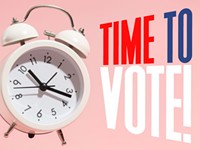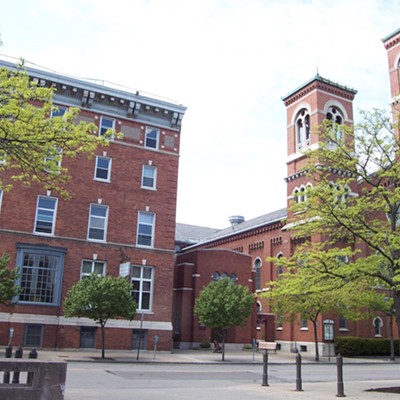[
{
"name": "500x250 Ad",
"insertPoint": "5",
"component": "15667920",
"parentWrapperClass": "",
"requiredCountToDisplay": "1"
}
]
The years can erode the complexity of historical figures. Their lives are reduced to two-dimensional images on currency and schoolroom walls, and then are further distilled into one-note symbols for the movements and mores of the day.
But the facts are almost always more robust, frustrating, and fascinating. That's certainly the case for Rochester suffragist star Susan B. Anthony.
Despite the grim visage with which we're all familiar, Anthony was no wallflower. She, by some accounts, told the judge exactly what she thought of her trial, the legal system, and her fine after being found guilty in 1873 of voting illegally the year before.
Yet Anthony left no clear historical trail when it comes to abortion, says Deborah Hughes, president and CEO of the National Susan B. Anthony Museum & House. And that, Hughes says, has allowed some to step into the void to assemble scraps from speeches, letters, newspaper articles, and other sources to attempt to customize Anthony for their cause.
That includes the Susan B. Anthony List and its affiliated political action committee, the SBA List Candidate Fund, Hughes says. The list and the fund "are dedicated to electing candidates and pursuing policies that will reduce and ultimately end abortion," says the SBA List's website. (Representatives of SBA List did not return a call for comment.)
And during this year's midterm elections, the SBA List sent a mailer to Iowa voters that incensed pro-choice activists.
"The outside of the mailer looks like an official announcement of a disease outbreak," Hughes wrote in a blog published recently on the Anthony House website. "Inside, it diagnoses that public health threat as the Democratic senatorial candidate."
In her blog, Hughes called the tactic outrageous and inconsistent with whom Anthony was.
"The thing we always object to is to connect Susan B. Anthony with a political party or political movement, like the pro-life movement," Hughes says. "That's something that's totally inappropriate."
Even if Anthony disapproved of abortion — or what was understood to be abortion during her lifetime; women weren't considered pregnant until they felt the baby move — she didn't believe in what she called legislating morality, Hughes says, so it's inappropriate to use her name to try to get certain people elected.
Carol Crossed, a Rochester resident and founder of the New York chapter of Feminists for Life and a well-known activist in the anti-abortion movement, says that Anthony's opposition to abortion is clear. For example, strong anti-abortion language is used in Anthony's newspaper, The Revolution, she says, and Anthony wouldn't have allowed that if she disagreed.
"It's very, very clear that she spoke out against it in all of its forms," Crossed says. "She used her newspaper as a vehicle. Susan B. Anthony did not allow her newspaper to be a voice for positions she disagreed with."
The fact that The Revolution addresses abortion as much as it does shows Anthony's opposition, Crossed says. Other suffragist newspapers of the time talked about abortion, she says, but not to the extent that The Revolution did.
Crossed, who says she prefers the term consistent life ethic to pro-life, also references Anthony's 1875 "social purity" speech.
"The prosecutions on our courts for breach of promise, divorce, adultery, bigamy, seduction, rape; the newspaper reports every day of every year of scandals and outrages, of wife murders and paramour shooting, of abortions and infanticides, are perpetual reminders of men's incapacity to cope successfully with this monster evil of society," reads an excerpt. (The evil that Anthony was referring to is drunkenness.)
City spoke to Hughes recently about Susan B. Anthony's legacy as it relates to abortion and the ways that the Anthony name is being used today. The following is an edited version of that discussion.
CITY: Why does what Susan B. Anthony thought about abortion matter today?
Hughes: The great thing is that people think that Susan B. Anthony has authority. How wonderful it is now that an organization can say, "Susan B. Anthony said this," and think that will influence you.
When I was kid, Susan B. Anthony wasn't even in textbooks. So to have her cited as an authority we should listen to I think is actually pretty exciting.
I think her profile's been raised. She's been acknowledged as arguably one of the four greatest revolutionaries in the world — it was an NPR article a couple of years ago. They were saying that in terms of nonviolent revolutions around the world that have had staying impact, it would be Martin Luther King, Gandhi, Susan B. Anthony, and Jesus, I think, were the four.
It's a good thing that people want to be connected with Susan B. Anthony's name. The interesting thing is that a lot of people think they know what Susan B. Anthony believed and what she stood for, but they haven't necessarily read the text.
Is it appropriate to try to extrapolate what Anthony believed about abortion? So much has changed since her time: medicine, technology, our understanding of biology....
I can't tell you what Susan B. Anthony felt about abortion. I can tell you she didn't advocate for the criminalization of abortion.
She had a cousin who had an abortion, who self-aborted and became very, very ill. And [Anthony] made a one-line comment after hearing that she had recovered. She said she will "rue the day she messed with nature." Now, what does that mean?
But to me, the issue is it's one thing for you and me to say, "I have this political opinion; Susan B. Anthony would back it." I have trouble with that. It's something entirely different to take a person like Susan B. Anthony who believed so clearly in a democracy that's based on transparency and freedom and do a political action that's coercive or deceptive or seeks to motivate you on something other than about the facts or the position.
If Susan B. Anthony believed in manipulating political systems to get the laws that she wanted to get, we probably would've had women voting a lot sooner. She didn't. She believed that if you were going to have sustainable social reform, you had to convert people's hearts.
She was for sex education. She was for birth control.
She was very political, but she was all about social reform. Actually, at one point, she said that you can't legislate morality. So if you really wanted to have social reform, you had to convince people what was the right thing to do or the wrong thing to do. You couldn't just say, "I'm going to tell you what the right thing or the wrong thing to do is." Or, "I don't care what you think. I know what's right for you. So I'm going to manipulate the political system to make you do what I think is the right thing." That's just not who she was. At all.
Given how outspoken Anthony was, why is there no definitive historical record of her opinion on abortion?
If Susan B. Anthony thought abortion should be criminalized, she should have said something. The woman never held back on her opinions. Susan B. Anthony didn't put herself in the discussion, so why are we having that discussion?
If we want to talk about why women terminate pregnancies, then that's a social-justice issue. She'd love us to talk about that. If we want to talk about who has access to the resources to determine the timing or the frequency of her pregnancies, she told us to talk about that and to address that issue.
If we want to talk about how economic disparity affects the health of children or the mortality rate, she would want us to talk about that. If we wanted to talk about why in Rochester we have one of the highest infant mortality rates in the country, she would want us to talk about all those issues.
If you want to talk about things that Susan B. Anthony was passionate about, that's easy. But why would we pick an issue about which she was not passionate? And the irony to me, the real challenge is that when we take people of good conscience and we name-call each other into one camp or another, and we therefore don't have the discussions that are hard to have about the social issues and why they're problems, then right there the wrong side wins. And that's a travesty.
Are there other ways that her legacy is being appropriated?
All the time.
An interesting discussion has been around segregated schooling. Not racially segregated — gender segregated. Susan B. Anthony didn't think that was where we should end up. She really believed that until you had boys and girls growing up together — in the playground, in school, after school, in everything that they do — they wouldn't have an appreciation for each other that would really let us be the society we could be.
So sometimes when people say [to people at the Susan B. Anthony House], "We have a girls school; you should support that. It's a natural mesh with the Susan B. Anthony House." It's like, "Well, we support quality education. But..."
Another piece is around social services. In 1903, the YWCA in Rochester was opening a new building. They were doing amazing services. Susan B. Anthony was there, asked to speak, and she commended them and said, "You're doing wonderful things for women and children, but you're treating the symptom. What are you doing to actually address poverty? What are you doing to make sure that women can have choices?"
Often people say, "Susan B. Anthony would like that we have this social program." I think she would be pushing people. She'd be saying, "It's great if I can make a gift to my church that's going to have a food cupboard. But it would be a lot better if I said, 'Is there a way for me to create a living-wage job for a person in my community?'"
I wish that we were better about the complexity. Susan B. Anthony, her legacy, has so much to teach us.
Speaking of...
-

Calendar preview: Time to vote
Oct 22, 2020 -

Susan B. Anthony Museum & House works with Mattel on new Barbie doll
Oct 6, 2020 -

Project pins up political art publicly
Jul 20, 2020 - More »
Latest in News
More by Christine Carrie Fien
-

Building up
Mar 29, 2017 -

Hetsko's heart
Mar 15, 2017 -

Squeezing starts at GateHouse-owned Daily Record and RBJ
Feb 28, 2017 - More »






